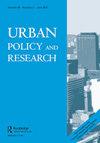National Urban Policy – Careful What You Wish For
IF 1.6
3区 社会学
Q4 ENVIRONMENTAL STUDIES
引用次数: 1
Abstract
Historically, the Commonwealth has involved itself haphazardly in matters of urban planning and development. These forays have ranged from the visionary, such as the Whitlam Government’s national urban policy of the 1970s, to the ludicrous where Commonwealth Ministers, no less, decide where to put toilet blocks and suburban car parks. With the federal election looming, what do we want from the next Commonwealth Government on urban policy? This is a case of careful what you wish for. To greater or lesser degrees, Australian Government involvement in cities over the decades has misunderstood or wantonly ignored the first principle of sound national urban policy – subsidiarity. Subsidiarity requires that policy making and taxation should be left with the most decentralised sphere of governance “competent” to carry out the function in question. This is not a question of technical competence or the skills of politicians and bureaucrats. A subsidiary sphere of governance, such as State, regional or local government, is deemed competent to make policy decisions in line with the preferences of their constituents when these decisions do not infringe policy choices reserved for a higher order constituency, such as that of the nation represented by the Commonwealth. For example, regardless of the merits of their thinking, State Governments are not competent to make decisions about going to war or international trade treaties, because these are the defined province of the Commonwealth Government. If subsidiarity were set aside, and we focussed solely on technical competence, all urban policy – from the making of planning schemes to the granting of development approvals – could be theoretically run out of Canberra (heaven forbid). The Commonwealth has the financial capacity to do so. The Whitlam Government pursued a highly centralised model of urban policy along these lines. Some might even cheer on this approach today; what could be wrong with nationally uniform practices on all matters to do with strategic and statutory planning? The problem with ignoring subsidiarity is that it weakens democracy and stifles innovation in public policy. If local constituencies are allowed to make decisions on development control and infrastructure which affect only them – and they are prepared to wear the fiscal cost of these decisions – community welfare will be improved. This is because the shape of neighbourhoods and towns will be more closely aligned to citizen preferences compared to a one size fits all. In addition, the fact that different local communities will do local things differently means that communities will learn from each other about how best to tackle certain urban issues. Subsidiarity strengthens democracy because accountability lines are clear. If decision making for local things is shared across the spheres of government – local, State and Commonwealth – in a “partnership” arrangement, who is to be held responsible if things don’t work? Local, State and Commonwealth politicians can evade accountability by blaming the other sphere(s) of government for, say, constraining local discretion or not providing sufficient funding.国家城市政策——小心你的愿望
从历史上看,英联邦曾随意参与城市规划和发展事务。这些尝试从有远见的,比如惠特拉姆政府20世纪70年代的国家城市政策,到可笑的,英联邦部长们同样决定在哪里设置厕所和郊区停车场。随着联邦大选的临近,我们希望下一届联邦政府在城市政策方面做什么?这是一个小心你的愿望的例子。几十年来,澳大利亚政府对城市的参与或多或少地误解或肆意忽视了健全国家城市政策的第一个原则——辅助性。辅助性要求政策制定和税收应由最分散的治理领域“有能力”履行相关职能。这不是技术能力问题,也不是政治家和官僚的技能问题。附属治理领域,如州、地区或地方政府,被视为有权根据其选民的偏好做出政策决定,前提是这些决定不侵犯为更高级别选民保留的政策选择,如英联邦代表的国家的政策选择。例如,无论各州政府的想法有多可取,它们都无权就发动战争或国际贸易条约做出决定,因为这些都是英联邦政府的既定职责。如果抛开辅助性不谈,我们只关注技术能力,那么从规划方案的制定到开发批准的批准,所有城市政策理论上都可能耗尽堪培拉(但愿如此)。英联邦有能力这样做。惠特拉姆政府沿着这些路线推行高度集中的城市政策模式。有些人甚至可能为今天的这种做法欢呼;在与战略和法定规划有关的所有问题上,国家统一的做法可能有什么错?忽视辅助性的问题在于,它削弱了民主,扼杀了公共政策的创新。如果允许地方选区就只影响他们的发展控制和基础设施做出决定,并且他们准备承担这些决定的财政成本,那么社区福利将得到改善。这是因为与一刀切相比,街区和城镇的形状将更符合公民的偏好。此外,不同的当地社区将以不同的方式处理当地事务,这意味着社区将相互学习如何最好地解决某些城市问题。补贴加强了民主,因为责任线是明确的。如果地方事务的决策在政府部门——地方、州和联邦——以“伙伴关系”安排共享,那么如果事情不起作用,谁来负责?地方、州和联邦政客可以通过指责其他政府部门限制地方自由裁量权或没有提供足够的资金来逃避责任。
本文章由计算机程序翻译,如有差异,请以英文原文为准。
求助全文
约1分钟内获得全文
求助全文

 求助内容:
求助内容: 应助结果提醒方式:
应助结果提醒方式:


